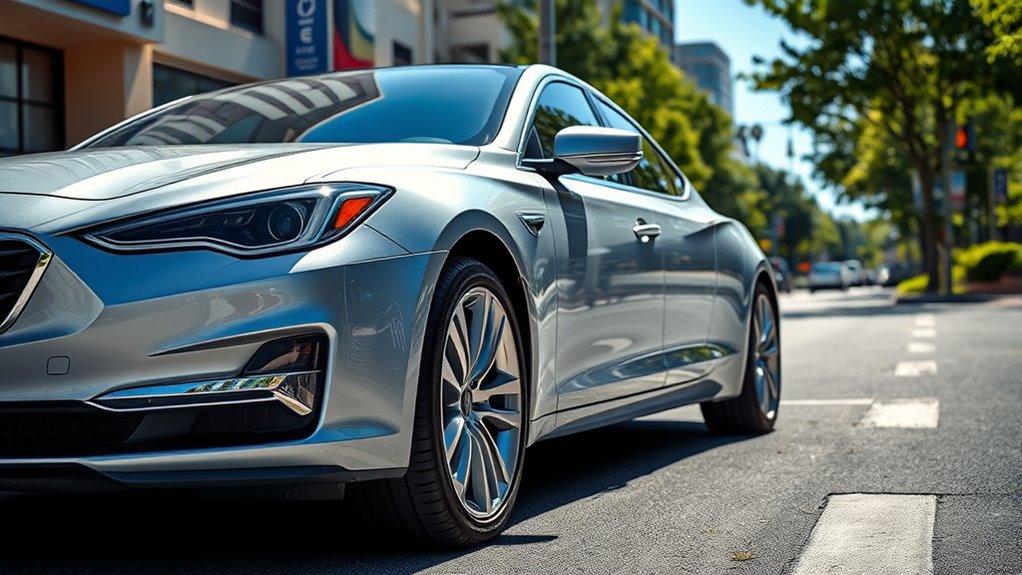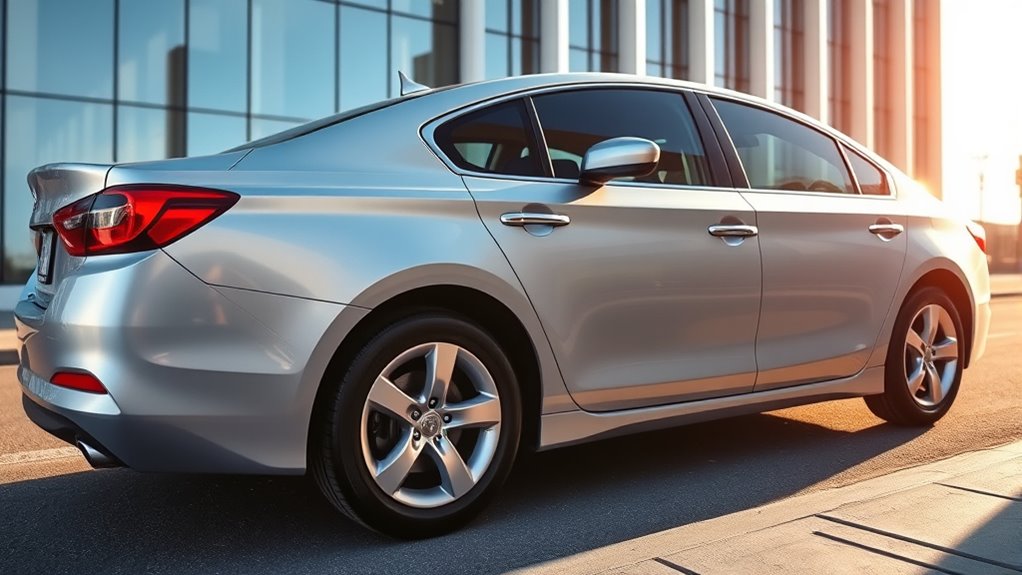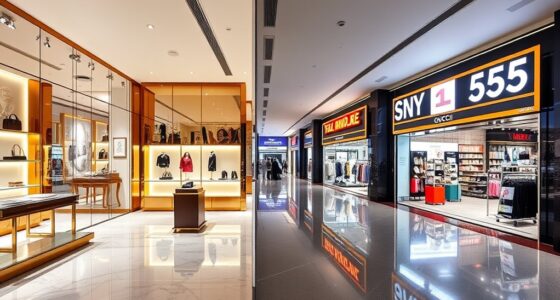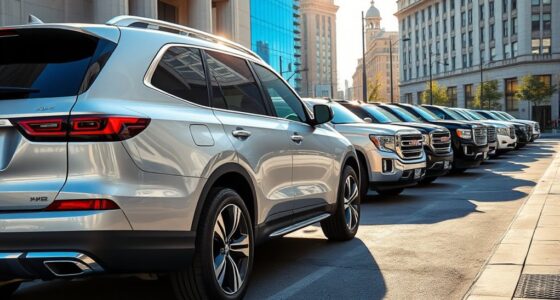Adding desirable luxury features like premium leather seats and high-end audio can boost your car’s lease value, while overly personalized options or aftermarket modifications may hurt it. Tech upgrades such as advanced safety and navigation systems tend to retain their appeal, but outdated or low-tech features can reduce resale potential. Avoid excessive customization, as it might make future buyers hesitant. Understanding which upgrades are valued can help you maximize your vehicle’s future worth; explore more to learn which ones make the biggest difference.
Key Takeaways
- Advanced safety and driver-assistance tech enhance appeal and can boost residual value when aligned with manufacturer recommendations.
- High-end luxury features like premium leather seats and wood trim may increase value if widely appreciated, but niche upgrades can hurt it.
- Overly personalized or aftermarket modifications may decrease future resale or lease return value due to limited market appeal.
- Installing outdated or low-tech systems can negatively impact residual value, whereas modern infotainment and connectivity features support it.
- Balance and market awareness are key; choose features that appeal broadly and avoid excessive customization to maximize lease value.

When it comes to leasing a car, the features you choose can considerably impact its resale or residual value at the end of the term. Selecting the right upgrades isn’t just about comfort or style; it can directly influence how much your vehicle is worth when you return it. Among the most influential features are luxury upgrades and technological features. These additions can make your lease more appealing to future buyers or lessees, but they can also backfire if chosen unwisely.
Luxury upgrades, such as premium leather seats, wood trim, or high-end audio systems, can boost the perceived value of your vehicle. They give the car a more upscale image, which can translate into a higher residual value. However, not all upgrades hold their worth equally. Overly personalized or niche luxury features may not appeal to a broad audience, potentially decreasing the vehicle’s desirability when it’s time to return the lease. For example, custom upholstery or aftermarket modifications might seem appealing initially but can be costly to repair or replace if damaged or worn out, reducing the car’s residual value.
Luxury upgrades like custom upholstery may boost appeal initially but can reduce residual value if damaged or worn out.
Technological features also play a crucial role. Modern cars equipped with advanced infotainment systems, navigation, driver-assistance, and safety tech tend to retain value better. These features are highly sought after because they improve driving convenience and safety, making the vehicle more attractive on the lease return market. On the flip side, outdated or low-tech options can hurt your vehicle’s value. If you lease a car with obsolete tech, it may seem less desirable, especially as newer models come with more innovative features. Installing aftermarket tech upgrades might seem tempting, but they often do not add to—and may even detract from—the car’s residual value due to potential compatibility issues or perceived lower quality. Additionally, understanding asset division laws and how they affect the division of valuable assets like vehicles is important if you’re considering modifications during a divorce.
It’s essential to strike a balance. While upgrading with desirable luxury and tech features can boost your lease’s value, overdoing it or selecting overly personalized options can work against you. Always consider the preferences of the broader market and the manufacturer’s recommendations. The goal is to choose features that enhance the vehicle’s appeal without making it too customized or complex to maintain. In the end, thoughtful choices about luxury upgrades and technological features can help you maximize your lease’s residual value, saving you money and hassle when it’s time to return or buy out the vehicle.
Frequently Asked Questions
How Does Vehicle Color Impact Lease Value?
Your vehicle color impacts lease value mainly through color popularity and paint durability. Popular colors like white, black, and silver tend to boost resale and lease value because they appeal to more buyers. Additionally, choosing a color with high paint durability means less fading and chipping over time, maintaining the car’s appearance. So, opt for timeless colors with durable paint to maximize your lease value and appeal.
Do Brand Reputations Influence Lease Residuals?
Think of your car’s brand reputation as a trusted knight in shining armor. You, as a savvy leaser, know luxury branding and brand loyalty can boost residuals, making your vehicle more valuable at lease end. A reputable brand fights off depreciation dragons, keeping your lease value high. Conversely, a lesser-known or distrusted brand might weaken your armor, reducing residuals and costing you more in the long run.
Can Previous Accidents Affect Lease Terms?
Yes, previous accidents can affect your lease terms. If your vehicle has insurance claims or a poor maintenance history, it may lower the residual value, leading to higher monthly payments or stricter lease conditions. Leasing companies consider these factors because they impact the car’s condition and future value. Keeping detailed maintenance records and avoiding accidents can help maintain better lease terms and protect your vehicle’s worth.
How Do Aftermarket Modifications Impact Lease Value?
Think of aftermarket modifications like adding spices to a dish—you might love it, but it can spoil the overall flavor. Performance upgrades and aesthetic modifications can hurt your lease value because they often void warranties and reduce resale value. Lease companies prefer stock vehicles, so if you’re considering mods, be prepared to face potential penalties or reduced lease terms. It’s best to check with your leasing company first.
Does Lease Mileage Limit Affect Vehicle Upgrade Options?
Your lease mileage limit can restrict your upgrade options, especially if you reach the mileage cap before lease end. Exceeding the limit often results in mileage penalties, which can be costly. If you want to extend your lease or upgrade to a newer vehicle, you might need a lease extension, but keep in mind that high mileage usage can complicate negotiations and increase costs, making upgrades less straightforward.
Conclusion
So, next time you’re choosing features for your leased car, ask yourself: will this upgrade make my ride more valuable or just more costly? Remember, smart choices can boost your car’s lease value, saving you money in the long run. Don’t overlook the impact of certain features—what seems like a small upgrade today could pay off big later. Are you ready to make your lease work harder for you?










